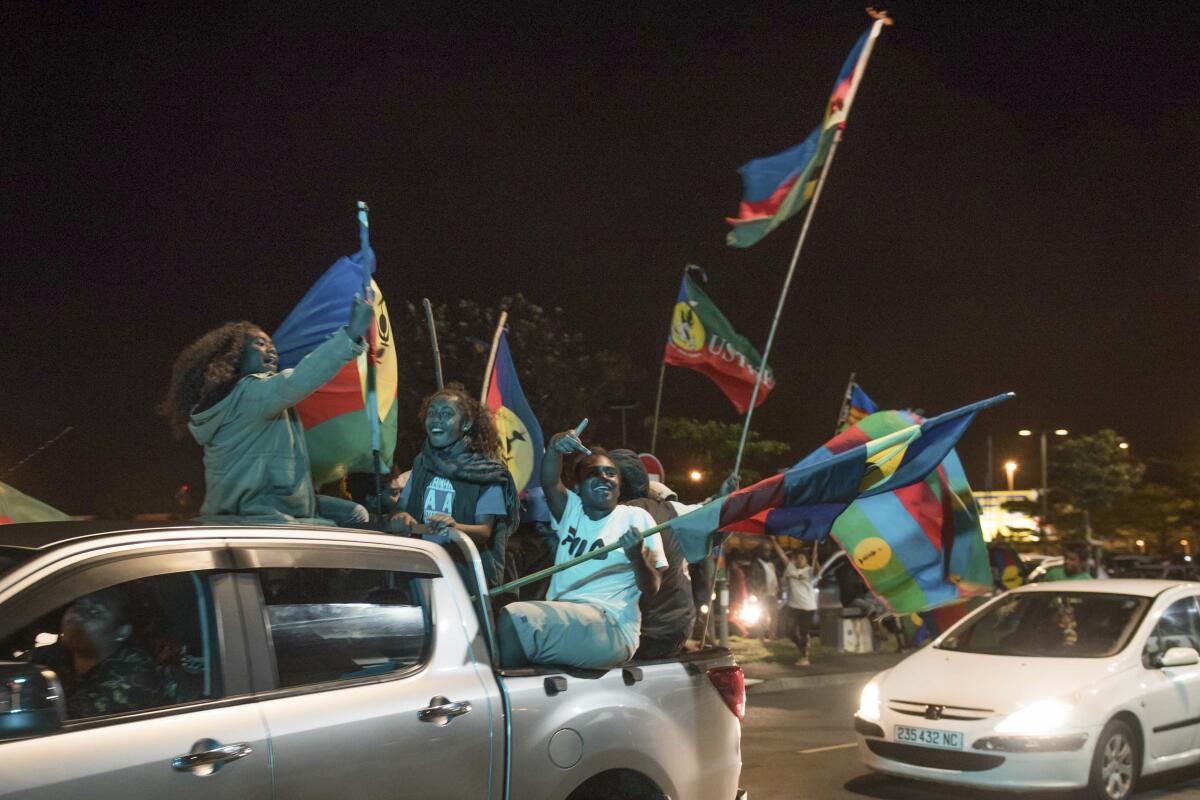New Caledonia voters choose to stay part of France

NOUMEA, New Caledonia — A majority of voters in New Caledonia, an archipelago in in the South Pacific, chose to remain part of France instead of backing independence Sunday, leading French President Emmanuel Macron to call for dialogue, as the referendum marked a crucial step in a three-decade decolonization effort.
In a televised address from Paris, Macron welcomed “an expression of confidence in the republic with a deep feeling of gratitude ... and modesty.”
Macron promised those in favor of independence, “This is with you, all together, that we will build New Caledonia tomorrow.”
He praised the “success” of the vote and called on New Caledonia residents to “look to the future.”
Native Kanak and descendants of French and other settlers paraded a giant wooden statue Saturday through the streets of Noumea on the South Pacific island of New Caledonia, turning the 152nd anniversary of its annexation by France into a celebration of ethnic diversity.
“We are facing our history in New Caledonia, a colonial history,” Macron said. “And we are trying to overcome it so that we are not trapped in it. We know that today we are at a crossroads.”
The overseas ministry said 53.3% of the voters who participated in the referendum Sunday chose to maintain ties with France, while 46.7% supported independence.
The vote was marked by high turnout. More than 85% of voters had cast their ballots one hour before poll stations closed, according to the overseas ministry. Some polling stations in Noumea, the capital, closed an hour late because people were still waiting in long lines to vote.
Sunday’s independence referendum was among the final steps of longstanding plans to settle tensions on the archipelago between native Kanaks seeking independence and residents willing to remain in France.
A peace deal between rival factions was achieved in 1988. A decade later, the Noumea Agreement granted New Caledonia political power and broad autonomy and planned the organization of up to three successive referendums.
Two years ago, 56.4% of people in a similar referendum voted against independence. A third referendum may be organized by 2022.
New Caledonian politicians acknowledged Sunday the need for dialogue between pro- and anti-independence groups.
The president of the archipelago’s government, Thierry Santa, is among those who want New Caledonia to remain a French territory. He stressed the “deep division” in the population.
“That’s up to us political leaders to have the intelligence to sit around a table and discuss what we want for the future,” Santa said.
Sonia Backes, president of the South province, is also in favor of keeping ties with France. “The ‘no’ won one more time, but we need to take into account all voters, including independence supporters,” she said.
The president of the Congress and a leading figure in the pro-independence movement, Roch Wamytan, vowed to “continue to fight for the independence of our country.”
The president of the pro-independence Caledonian Union party, Daniel Goa, called on residents to “not let themselves be overwhelmed by emotions and welcome the result in a pacifist atmosphere.”
The archipelago has a population of 270,000, including native Kanaks, who once suffered from strict segregation policies and widespread discrimination, and descendants of European colonizers.
New Caledonia became French in 1853 under Emperor Napoleon III — Napoleon’s nephew and heir — and was used for decades as a prison colony. It became an overseas territory after World War II, with French citizenship granted to all Kanaks in 1957.
More to Read
Sign up for Essential California
The most important California stories and recommendations in your inbox every morning.
You may occasionally receive promotional content from the Los Angeles Times.










